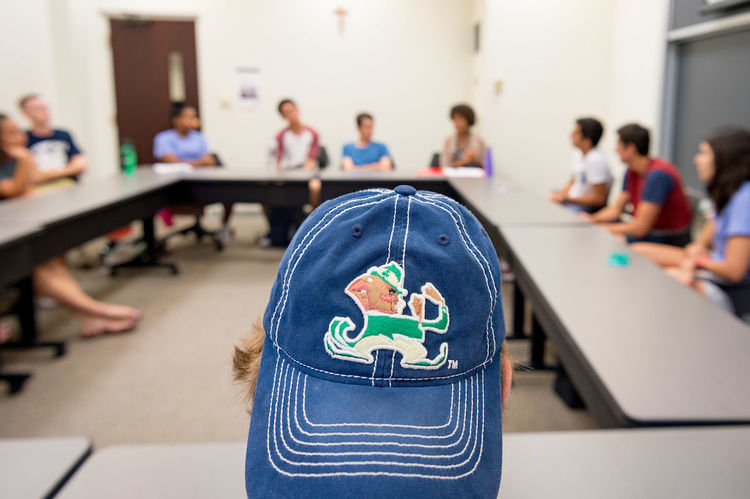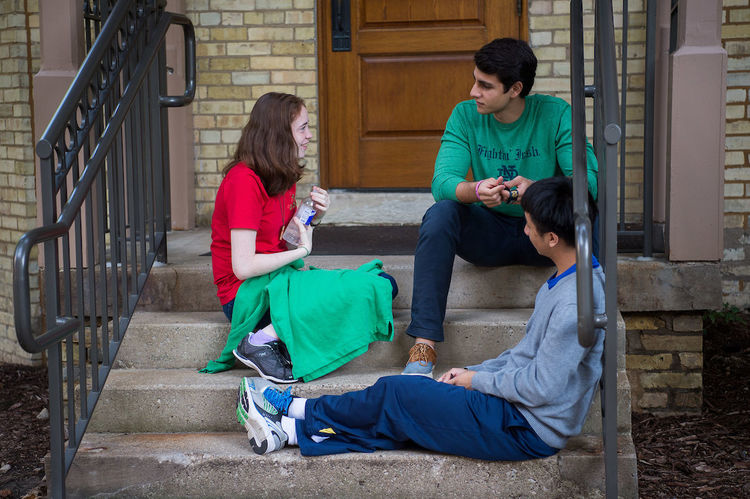For Bob and Clare Mundy, the idea to co-teach a Moreau First-Year Experience seminar wasn’t born in a classroom.
Rather, their decision traces its roots to a family car ride back from Indianapolis last year.
“I suggested it,” Clare says, more as if she were confessing than taking credit. “But it was a quick sign-on!”
Bob, the director of undergraduate admissions, and his daughter Clare, an assistant director in the Office of the President, are just two of the many faces welcoming Notre Dame’s Class of 2022 to campus through the Moreau seminar.
 Students in a Moreau seminar in fall 2016. Photo by Matt Cashore '94
Students in a Moreau seminar in fall 2016. Photo by Matt Cashore '94
The Moreau First-Year Experience, a required course for all first-year students, is entering its fourth year this fall. Each one-credit seminar section is capped at 19 students, and students take one section both semesters of their freshman year.
“The Moreau class puts faculty members in close contact with young people who are, for the very first time probably, living away from home, trying to become familiar with a university environment that is at once wonderful, unusual, strange, terrifying, and exciting,” says Rev. Hugh Page, Dean of the First Year of Studies, who himself is entering his third year as a Moreau instructor.
The seminar utilizes a flipped-model approach, where instructors are responsible for facilitating and lightly steering conversation while students are tasked with providing the meat of the discussion.
“It’s an opportunity to be part of, as I call it, a learning ensemble,” Page said. “Everyone is going to be thrust into the position of being a learner at times, and everyone is going to be thrust into the role of a teacher at some point.”
Topics covered in each seminar range from building healthy relationships and understanding the benefits of incorporating sleep and exercise into a student’s daily routine to providing history lessons about Notre Dame’s campus, the Congregation of Holy Cross and important University figures like Rev. Theodore Hesburgh, CSC.
Though the Mundys aren’t the only pair that co-teaches a seminar, they are (as far as they’ve been told) the first father-daughter duo in the class’s short history.
“I just always thought it would be really fun to co-teach with my dad,” Clare says.
“I couldn’t teach the class before because of travel obligations,” adds Bob, “so co-teaching gave me a perfect opportunity to do it and not worry about, ‘What if I’m going to have to miss three classes?’ I put two and two together very quickly.”
While the teaching dynamic of “Mundys on Thursday” — officially the course’s Section 57 — may be unique, it’s one in a series of instructorships that look a bit different from the standard image of a tweed-wearing college professor. Any faculty member, Holy Cross religious, or University staffer who has a Master’s degree can apply to teach the course, so the resulting instructor-and-student groups present all involved with a chance for interactions and relationship-building that may not have happened otherwise. This year, the cohort of instructors represents 50 academic and non-academic units of the University — talk about cross-curricular.
“The Moreau seminar allows students to interact with people they wouldn’t necessarily cross paths with on a regular basis,” says Lauren Donahue, the program director for new student engagement in the department of student affairs. “But it also provides those who don’t necessarily cross paths with students on a regular basis the opportunity to really understand the student experience.”
The model has proven popular, both with instructors and students. The seminar boasts an instructor-retention rate of over 80 percent, and students say the class is a crucial tool in their transition into college life.
Sophomore Kaitlyn Cox took her fall Moreau seminar last year with Rev. Pete McCormick, CSC — the director of campus ministry at Notre Dame — and Kate Barrett, who works in McCormick’s department as the associate director of liturgy.
“I know they say ‘You won’t just be a number here’, but that fear is still in the back of your mind,” Cox says. “Fr. Pete and Kate didn’t make me feel like that at all — they were very invested in me. Through the prompts and just seeing them outside of class, I felt like I was able to form a more personal connection.”
For his part, McCormick says that the seminar highlights an important part of the Notre Dame experience.
“The greatest potential of Moreau is the people you get to meet,” he says. “I think that’s the nature of a Notre Dame education. You get world-class professors, but what makes Notre Dame is the world-class people that are recruited to be here and the chance to get to know them.”
Laurie McFadden, a Moreau instructor and a broadcast media specialist for WVFI, WSND-FM and NDtv, says she tries to be “a friendly face in the crowd” for her first-year students. She has written letters of recommendation for former members of her class and, she says, has built relationships deeper than that of the average student and professor thanks to the personal nature of much of the course’s syllabus.
If fellow instructor Heather Ryan is any indication, though, the “getting-to-know-you” element of the seminar occasionally works both ways. By day, Ryan is the director of the Office of Community Standards — the student disciplinary body formerly known (and feared) as ResLife.
The class, Ryan says, presents “an opportunity for students to understand that I can have a role on campus where I can hold them accountable, but then also that we are people as well. We are trying to do our jobs to help students become more complete people.”
One of the ways the Moreau class promotes that idea is by taking classes on “campus visits” to significant sites such as the Log Chapel and Fr. Hesburgh’s office and allowing space for other unorthodox class activities.
 Fall 2016 Moreau students in a small-group discussion near Main Building. Photo by Matt Cashore '94
Fall 2016 Moreau students in a small-group discussion near Main Building. Photo by Matt Cashore '94
Cox recalls that her instructors led the class in a game of kickball during midterm week last year.
“We all just played and laughed, we were high-fiving and just running around,” Cox said, before adding that kickball caused her anxiety in high school gym classes. “That was the moment I realized I needed more exercise, because I felt so good after that. I felt like my whole day had been changed.
“By having us doing that, it just reinforced what they wanted to teach us.”
“The coolest piece we do in the class, in my opinion, is the visit to the Log Chapel,” said Ron Powlus, a four-year Moreau instructor, the interim associate athletic director of football operations, and a former Notre Dame quarterback. “I don’t think students have been engaged with the Chapel as much as the Basilica. You get a better appreciation of this place from that trip.”
Powlus also said he enjoys connecting with some of his players over the shared off-field experience of the weekly Moreau assignments.
“The football players are funny, because I’ll walk through the locker room after practice and say, ‘Hey, did you read that article or watch that video?’” Powlus said. “The players will just look at me, shocked, and say, ‘How do you know?’ I would never have one in class, but it’s fun to interact with them that way. Bigger picture, [the Moreau class] probably speaks to how well Notre Dame works together across departments and across entities.”
The accomplishment of gathering a broad and diverse corps of instructors to facilitate conversations with the 2,000+ first-year students in each new incoming class at Notre Dame bears witness to that collaboration.
- Cool Classes
- Irish-American Tap Dance
- One's Life Story
- American Political Journalism
- Summer Abroad
- Culture, Conflict, and Commemoration
- Moreau First-Year Experience
- Beginning Furniture
- The Chemistry of Fermentation
- Rethinking Crime and Justice
- Playing Shakespeare
- The Arts of Asia
“We knew [Moreau] would be a big project, where it would take several years for it to be a settled part of the curriculum,” says FYS’s Dean Page. “We also knew, in the Notre Dame landscape, this was the first curricular change of substance — even though it was only a one-credit course — in 50 years, and it anticipated that larger-scale change that accompanied the review of the core curriculum.”
“There wasn’t time to pilot this,” explains Donahue, the Student Affairs program director. “We jumped right on in and had this class for 2,000 students, trying to recruit all these instructors, and it was a very quick development of creating this content, finding the material for students to review each week.”
“I’m so thankful to First Year of Studies and all the experts around campus who generate the content,” says Andrew Sama, the University’s facilities information director and a Moreau co-instructor with his wife, Julia. “I just have to read the content, understand it, and find a way to get the students to talk about it.
“I often tell my students, ‘Remember, this topic that we’re dealing with today, all 2,000 classmates of yours dealt with it this week too, whether it’s your roommate or the person you’re sitting next to at the dining hall. Everyone has gone through what you’ve gone through digesting this content, and they’re thinking about it.’”
“I didn’t realize how important conversation is for young people today,” Page says, “and sometimes how rare it is to have mediated, meaningful conversation that involves not just peers, but people who are considered to be in teaching roles, and to have heartfelt conversation about stuff that really matters.
“Having the opportunity to do that I hope signals to students this isn’t your average, ordinary first-year experience.”
Zach Klonsinski is an admissions counselor in the Office of Undergraduate Admissions.